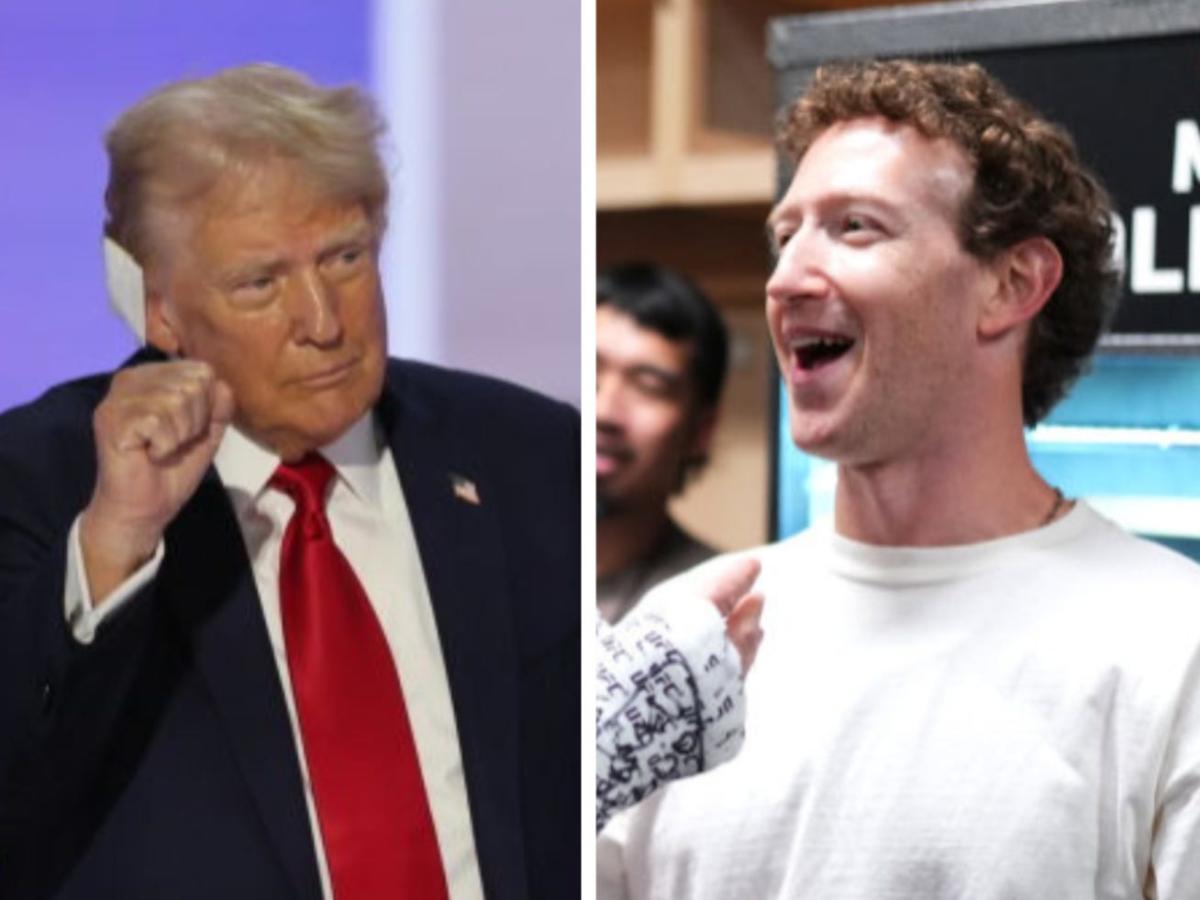Zuckerberg's Strategic Response To The Trump Presidency

Table of Contents
This article analyzes Mark Zuckerberg's strategic responses to the challenges posed by the Trump presidency. We'll examine how Facebook navigated intense political pressure, regulatory scrutiny, and accusations of bias and misinformation, exploring key decisions and their lasting impact on the company's trajectory and the broader landscape of social media and politics. The Trump era presented unprecedented challenges for Facebook, forcing Zuckerberg to constantly adapt his strategies in a rapidly evolving political and technological environment.
The Rise of Misinformation and Foreign Interference
The Trump presidency coincided with a surge in misinformation and foreign interference on social media platforms, posing a significant challenge to Facebook's operations. This section explores Facebook's response to these critical issues.
Combating the Spread of Fake News
The proliferation of fake news during the 2016 US presidential election and beyond forced Facebook to confront its role in disseminating false information. The company implemented several strategies:
- Implementation of fact-checking programs: Partnerships with independent fact-checking organizations allowed Facebook to flag and demote false news stories. However, this approach faced criticism for potential bias and limitations in addressing sophisticated disinformation campaigns.
- Algorithm adjustments: Facebook tweaked its algorithms to prioritize news from reputable sources and reduce the visibility of fake news articles. The effectiveness of these adjustments remained a subject of ongoing debate.
- Challenges in defining and identifying fake news: The very definition of "fake news" proved contentious, with accusations of partisan bias and concerns about censorship arising frequently. This inherent ambiguity complicated Facebook's efforts.
Specific examples, such as the spread of false narratives about the election itself or the Pizzagate conspiracy theory, highlighted the scale of the problem and the difficulties Facebook faced in containing it. The impact on election outcomes and public trust remains a subject of extensive research and ongoing discussion.
Addressing Foreign Interference in Elections
The revelation of Russian interference in the 2016 US election, using Facebook as a vector for disseminating propaganda and divisive content, prompted a significant shift in Facebook's approach to security. This involved:
- Investigations into Russian interference: Facebook cooperated with government investigations, uncovering a vast network of fake accounts and coordinated disinformation campaigns originating from Russia.
- Increased transparency measures: Facebook implemented measures to increase the transparency of political advertising, requiring disclosure of who paid for ads and their target audiences.
- Challenges in detecting sophisticated interference tactics: Sophisticated techniques, such as the use of bots and troll farms, made detecting and preventing foreign interference a continuous and complex challenge.
The Mueller Report detailed Russian efforts to sow discord and influence the election, underscoring the vulnerabilities of social media platforms and the need for stronger safeguards. Facebook's response highlighted the ongoing arms race between platforms and those seeking to manipulate them.
Navigating Regulatory Scrutiny and Political Pressure
The Trump presidency also brought heightened regulatory scrutiny and political pressure on Facebook. Zuckerberg himself faced intense questioning from lawmakers.
Facing Congressional Hearings and Investigations
Zuckerberg's testimony before Congress in 2018 was a pivotal moment. He faced intense questioning from both Republicans and Democrats regarding Facebook's role in the spread of misinformation, data privacy breaches, and foreign interference.
- Criticism from lawmakers: Lawmakers from across the political spectrum expressed concerns about Facebook's practices and the platform's impact on society.
- Ongoing investigations: Multiple investigations into Facebook's practices were launched, leading to calls for increased regulation and greater accountability.
- Evolving regulatory landscape: The political climate fueled calls for new regulations aimed at controlling social media companies, such as potential antitrust actions and content moderation legislation.
Zuckerberg's performance at these hearings significantly influenced public perception and ultimately shaped Facebook's strategic direction.
Balancing Free Speech and Content Moderation
A major challenge for Zuckerberg was balancing the principle of free speech with the need to prevent the spread of harmful content. This delicate balance led to ongoing criticism:
- Debate over censorship and freedom of expression: Accusations of censorship and bias arose frequently, particularly from conservative voices who felt their content was unfairly targeted.
- Challenges in developing consistent content moderation policies: Establishing clear, consistent, and unbiased content moderation policies proved extremely difficult, leading to inconsistent enforcement and ongoing controversy.
- Tension between protecting free speech and preventing harm: The inherent tension between these two competing values made finding an acceptable solution a constant challenge.
Specific instances of controversial content moderation decisions, and their resulting backlash, highlighted the inherent complexities of managing a global platform.
Shifting Strategies and Long-Term Impacts
The challenges faced during the Trump presidency forced Facebook to adapt its strategies and consider the long-term consequences of its actions.
Focus on Privacy and Data Security
The Cambridge Analytica scandal, in which user data was improperly harvested and used for political purposes, had a profound impact on Facebook and triggered a significant shift towards privacy:
- The Cambridge Analytica scandal and its impact: This data breach severely damaged Facebook's reputation and spurred increased scrutiny of its data practices.
- Increased emphasis on user privacy: Facebook responded with increased investment in user privacy and the implementation of new data protection measures.
- Evolving privacy regulations (GDPR, CCPA): New privacy regulations, such as the GDPR in Europe and the CCPA in California, further impacted Facebook's practices and its approach to data security.
- Long-term consequences for user trust: The scandal and subsequent events significantly impacted user trust, raising long-term questions about Facebook's responsibility in protecting user data.
The Evolving Role of Social Media in Politics
The Trump presidency exposed the profound influence of social media on political discourse:
- Influence of social media on political discourse: Social media platforms became crucial battlegrounds for political campaigns and the dissemination of political messaging.
- Long-term effects of misinformation and foreign interference: The lasting impact of misinformation and foreign interference on elections and public opinion remains a major concern.
- Ongoing debate about responsibility of social media platforms: The debate over the responsibility of social media platforms in shaping public opinion and combating misinformation continues to evolve.
- Potential future regulatory changes: The experiences of the Trump era are likely to influence future regulatory changes affecting social media companies.
The legacy of the Trump presidency and Facebook's response will continue to shape discussions around the role of social media in the political landscape for years to come.
Conclusion
This analysis demonstrates the significant challenges Zuckerberg and Facebook faced during the Trump presidency. From combating misinformation and foreign interference to navigating intense regulatory scrutiny, the company's responses shaped its trajectory and raised crucial questions about the role of social media in democracy. Understanding Zuckerberg's strategic response provides valuable insight into the complex dynamics of social media, politics, and regulation. Further research into this evolving relationship will be crucial to navigating the future of online political discourse and responsible social media usage. Continue exploring the impact of Zuckerberg's strategies and the ongoing dialogue around social media's role in shaping the political landscape.

Featured Posts
-
 Decoding Big Rig Rock Report 3 12 And Laser 101 7
May 23, 2025
Decoding Big Rig Rock Report 3 12 And Laser 101 7
May 23, 2025 -
 Smotret Onlayn Rybakina Srazhaetsya Za 4 Milliarda
May 23, 2025
Smotret Onlayn Rybakina Srazhaetsya Za 4 Milliarda
May 23, 2025 -
 Swiss Alpine Village Evacuation Livestock Moved By Hoof And Helicopter Due To Landslide Risk
May 23, 2025
Swiss Alpine Village Evacuation Livestock Moved By Hoof And Helicopter Due To Landslide Risk
May 23, 2025 -
 The New Netflix Dark Comedy Starring Kevin Bacon And Julianne Moore
May 23, 2025
The New Netflix Dark Comedy Starring Kevin Bacon And Julianne Moore
May 23, 2025 -
 Investigating The Use Of Space Crystals In Drug Research And Development
May 23, 2025
Investigating The Use Of Space Crystals In Drug Research And Development
May 23, 2025
Latest Posts
-
 Memorial Day 2025 Shopping Editors Top Sales And Deals
May 23, 2025
Memorial Day 2025 Shopping Editors Top Sales And Deals
May 23, 2025 -
 The Last Rodeo Neal Mc Donoughs Standout Performance
May 23, 2025
The Last Rodeo Neal Mc Donoughs Standout Performance
May 23, 2025 -
 Score Big Savings Best Memorial Day Sales And Deals 2025
May 23, 2025
Score Big Savings Best Memorial Day Sales And Deals 2025
May 23, 2025 -
 Neal Mc Donough A Leading Role In The Last Rodeo
May 23, 2025
Neal Mc Donough A Leading Role In The Last Rodeo
May 23, 2025 -
 Best 2025 Memorial Day Sales And Deals A Shopping Editors Picks
May 23, 2025
Best 2025 Memorial Day Sales And Deals A Shopping Editors Picks
May 23, 2025
